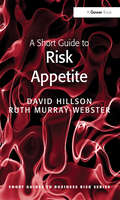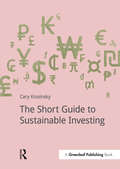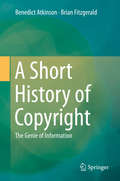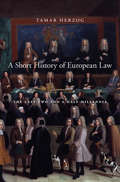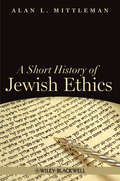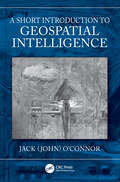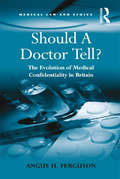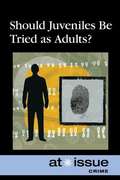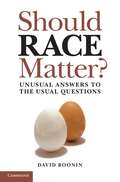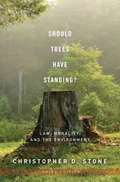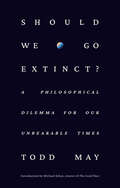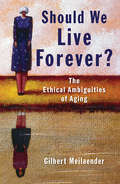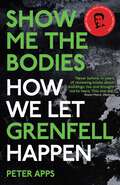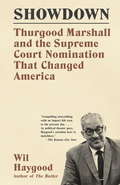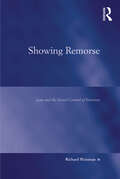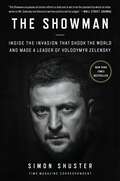- Table View
- List View
A Short Guide to Risk Appetite (Short Guides to Business Risk)
by David Hillson Ruth Murray-WebsterHow much risk should we take? A Short Guide to Risk Appetite sets out to help all those who need to decide how much risk can be taken in a particular risky and important situation. David Hillson and Ruth Murray-Webster introduce the RARA Model to explain the complementary and central roles of Risk Appetite and Risk Attitude, and along the way they show how other risk-related concepts fit in. Risk thresholds are the external expression of inherent risk appetite, and the challenge is how to set the right thresholds. By progressively deconstructing the RARA Model, the authors show that the essential control step is our ability to choose an appropriate risk attitude. The book contains practical guidance to setting risk thresholds that take proper account of the influences of organisational risk culture and the individual risk preferences of key stakeholders. Alongside this, individuals and organisations need to choose the risk attitude that will optimise their chances of achieving the desired objectives.
The Short Guide to Sustainable Investing (Doshorts Ser.)
by Cary KrosinskyThe vast majority of invested assets do not consider environmental, social or governance (ESG) factors. Socially responsible investing (SRI) emerged to address these challenges, but it remains largely deployed in "negative strategies" such as sector screening, and continues to be a small investment niche, largely due to perceptions about potential underperformance.Sustainable investing is a new, more positive investment construct, described as "an investment discipline that explicitly considers future social and environmental trends in financial decision making, in order to provide the best risk-adjusted and opportunity-directed returns for investors. By anticipating these trends ahead of the market, sustainable investing seeks to identify 'predictable surprises' that can help maximize value over the long term."This concise guide by one of the sector's leading experts: Disentangles the terminology around SRI and describes a new, positive, opportunities-oriented paradigm for sustainable investing Showcases funds and strategies that are delivering outperformance within ecological limitsSets out the key megatrends and scenarios which investors need to consider, and Offers a practical guide to constructing a sustainable portfolio. This is absolutely essential reading for investors, fund managers and analysts who need to get up to speed on sustainable investing.
A Short History of Copyright: The Genie of Information
by Brian Fitzgerald Benedict AtkinsonThis book tells the story of how, over centuries, people, society and culture created laws affecting supply of information. In the 21 century, uniform global copyright laws are claimed to be indispensable to the success of entertainment, internet and other information industries. Do copyright laws encourage information flow? Many say that copyright laws limit dissemination, harming society. In the last 300 years, industries armed with copyrights controlled output and distribution. Now the internet's disruption of economic patterns may radically reshape information regulation. Information freedom, a source of emancipation, may change the world.
A Short History of European Law: The Last Two and a Half Millennia
by Tamar HerzogTamar Herzog offers a road map to European law across 2,500 years that reveals underlying patterns and unexpected connections. By showing what European law was, where its iterations were found, who made and implemented it, and what the results were, she ties legal norms to their historical circumstances and reveals the law’s fragile malleability.
A Short History of Jewish Ethics: Conduct and Character in the Context of Covenant
by Alan L. MittlemanA Short History of Jewish Ethics traces the development of Jewish moral concepts and ethical reflection from its Biblical roots to the present day. Offers an engaging and thoughtful account of Jewish ethics Brings together and discusses a broad range of historical sources covering two millennia of writings and conversations Combines current scholarship with original insights Written by a major internationally recognized scholar of Jewish philosophy and ethics
A Short Introduction to Geospatial Intelligence
by Jack O'ConnorA Short Introduction to Geospatial Intelligence explains the newest form of intelligence used by governments, commercial organizations, and individuals. Geospatial intelligence combines late 20th century historically derived ways of thinking and early 21st century technologies of GIS, GPS, digital imaging satellites and communications satellites to identify, measure, and analyze the current risk in the world. These ways of thinking have developed from military engineering, cartography, photointerpretation, and imagery analysis. While the oldest example dates back to the early 16th century, all the ways of spatial thinking share the common thread of being developed and refined during conflicts to help military leaders make informed decisions prior to action. In the 21st century— thanks in great part to advances in digital precision technology, miniaturization, and the commercialization of satellites— these ways of thinking have expanded from the military into various other industries and sectors including energy, agriculture, environment, law enforcement, global risk assessment, and climate monitoring. Features: • Analyzes human and algorithmic models for dealing with the challenge of analytic attention, in an age of geospatial data overload • Establishes an original model— envisioning, discovery, recording, comprehending, and tracking— for the spatial thinking that underpins the practice and growth of this emerging discipline • Addresses the effects of small satellites on the collection and analysis of geospatial intelligence A Short Introduction to Geospatial Intelligence describes the development of the five steps in geospatial thinking— envisioning, discovery, recording, comprehending, and tracking— in addition to addressing the challenges, and future applications, of this newest intelligence discipline.
A Short Introduction to International Law
by Emmanuelle Tourme Jouannet Christopher SutcliffeIn our globalised world the sources and actors of international law are many and its growth prolific and disorderly. International law governs the actions of states on matters as long-established as diplomatic immunity or as recent as the War on Terror, and it now impacts upon the lives of ordinary citizens in areas as diverse as banking and investment, public health and the protection of the environment. In this accessible introduction Emmanuelle Tourme Jouannet explains the latest developments in international law in the light of its history and culture, presenting it as an instrument both for dominance and for change that adjusts and balances the three pillars of the United Nations Charter: the prohibition of the use of force; economic, social and sustainable development; and human rights.
Shortlisted: Women in the Shadows of the Supreme Court
by Hannah Brenner Johnson Renee Knake JeffersonWinner, Next Generation Indie Book Awards - Women's NonfictionBest Book of 2020, National Law JournalThe inspiring and previously untold history of the women considered—but not selected—for the US Supreme CourtIn 1981, Sandra Day O’Connor became the first female justice on the United States Supreme Court after centuries of male appointments, a watershed moment in the long struggle for gender equality. Yet few know about the remarkable women considered in the decades before her triumph.Shortlisted tells the overlooked stories of nine extraordinary women—a cohort large enough to seat the entire Supreme Court—who appeared on presidential lists dating back to the 1930s. Florence Allen, the first female judge on the highest court in Ohio, was named repeatedly in those early years. Eight more followed, including Amalya Kearse, a federal appellate judge who was the first African American woman viewed as a potential Supreme Court nominee. Award-winning scholars Renee Knake Jefferson and Hannah Brenner Johnson cleverly weave together long-forgotten materials from presidential libraries and private archives to reveal the professional and personal lives of these accomplished women.In addition to filling a notable historical gap, the book exposes the tragedy of the shortlist. Listing and bypassing qualified female candidates creates a false appearance of diversity that preserves the status quo, a fate all too familiar for women, especially minorities. Shortlisted offers a roadmap to combat enduring bias and discrimination. It is a must-read for those seeking positions of power as well as for the powerful who select them in the legal profession and beyond.
Shotguns and Stagecoaches: The Brave Men Who Rode for Wells Fargo in the Wild West
by John Boessenecker“A rip-roaring history of moving the mail in the wildest of the Wild West days” from the New York Times–bestselling author of Texas Ranger (Kirkus Reviews).Here are the true stories of the Wild West heroes who guarded the iconic Wells Fargo stagecoaches and trains, battling colorful thieves, vicious highwaymen, and robbers armed with explosives.The phrase “riding shotgun” was no teenage game to the men who guarded stagecoaches and trains on the Western frontier. Armed with sawed-off, double-barreled shotguns and an occasional revolver, these express messengers guarded valuable cargo through lawless terrain. They were tough, fighting men who risked their lives every time they climbed into the front boot of a Concord coach.Boessenecker introduces soon-to-be iconic personalities like “Chips” Hodgkins, an express rider known for his white mule and his ability to outrace his competitors, and Henry Johnson, the first Wells Fargo detective. Their lives weren’t just one shootout after another—their encounters with desperadoes were won just as often with quick wits and memorized-by-heart knowledge of the land.The highway robbers also get their due. It wouldn’t be a book about the Wild West without Black Bart, the most infamous stagecoach robber of all time, and Butch Cassidy’s gang, America’s most legendary train robbers.Through the Gold Rush and the early days of delivery with horses and saddlebags, to the heyday of stagecoaches and huge shipments of gold, and finally the rise of the railroad and the robbers who concocted unheard-of schemes to loot trains, Wells Fargo always had courageous men to protect its treasure. Their unforgettable bravery and ingenuity make this book a thrilling read.
Shots Fired: The Misunderstandings, Misconceptions, and Myths about Police Shootings
by Kate Flora Joseph K. LoughlinGet a deeper understanding of police shootings through interviews with officers involved in real-life casesToday’s media is filled with discussions about officer-involved shootings. Too often missing from that discussion are the police officers’ voices and the reality of what happens in actual shooting incidents. Through actual interviews with involved officers, this book addresses common myths and misunderstandings about these shootings. Shots Fired is a journey “behind the shield” and the experiences of the real human beings behind the badge. It explores true events through the participants’ own eyes and takes readers inside the minds of officers during the actual event. The officers detail the roller coaster of emotions and severe trauma experienced during and after a shooting event. Along with the intimate, in-depth explorations of the incidents themselves, the book touches the aftermath of police-involved shootings—the debriefings, internal and external investigations, and psychological evaluations. It challenges many commonly held assumptions created by the media such as the meaning of “unarmed” and why the police can’t just “shoot him in the leg,” creating an understanding that reaches beyond slogans such as “hands up, don’t shoot.”The book is valuable reading for anyone who wants a deeper understanding of police shootings—officers and police departments, reporters and politicians, and the public who rely on the police to keep them safe.
Should A Doctor Tell?: The Evolution of Medical Confidentiality in Britain
by Angus H. FergusonMedical confidentiality has long been recognised as a core element of medical ethics, but its boundaries are under constant negotiation. Areas of debate in twenty-first century medicine include the use of patient-identifiable data in research, information sharing across public services, and the implications of advances in genetics. This book provides important historical insight into the modern evolution of medical confidentiality in the UK. It analyses a range of perspectives and considers the broader context as well as the specific details of debates, developments and key precedents. With each chapter focusing on a different issue, the book covers the common law position on medical privilege, the rise of public health and collective welfare measures, legal and public policy perspectives on medical confidentiality and privilege in the first half of the twentieth century, contestations over statutory recognition for medical privilege and Crown privilege. It concludes with an overview of twentieth century developments. Bringing fresh insights to oft-cited cases and demonstrating a better understanding of the boundaries of medical confidentiality, the book discusses the role of important interest groups such as the judiciary, Ministry of Health and professional medical bodies. It will be directly relevant for people working or studying in the field of medical law as well as those with an interest in the interaction of law, medicine and ethics.
Should Equity Be a Goal of Economic Policy?
by IMF Fiscal Affairs DepartmentA report from the International Monetary Fund.
Should Financial Sector Regulators Be Independent?
by Marc Quintyn Michael W. TaylorIn nearly every major financial crisis of the past decade-from East Asia to Russia, Turkey, and Latin America-political interference in financial sector regulation helped make a bad situation worse. Political pressures not only weakened financial regulation, but also hindered regulators and supervisors from taking action against troubled banks. This paper investigates why, to fulfill their mandate to preserve financial sector stability, financial sector regulators and supervisors need to be independent-from the financial services industry as well as from the government-as well as accountable.
Should Juveniles Be Tried as Adults? Opposing Viewpoints
by Christine WatkinsThis book looks at the various points of view pertaining to the question of effectively dealing with juveniles in the court system.
Should Race Matter? Unusual Answers to the Usual Questions
by David BooninPhilosopher David Boonin attempts to answer the moral questions raised by five important and widely contested racial practices: slave reparations, affirmative action, hate speech restrictions, hate crime laws and racial profiling. Arguing from premises that virtually everyone on both sides of the debates over these issues already accepts, Boonin arrives at an unusual and unorthodox set of conclusions, one that is neither liberal nor conservative, color conscious nor color blind. Defended with the rigor that has characterized his previous work but written in a more widely accessible style, this provocative and important new book is sure to spark controversy and should be of interest to philosophers, legal theorists and anyone interested in trying to resolve the debate over these important and divisive issues.
Should trees have Standing: Law, Morality, and the Environment,
by Christopher D. StoneIn this collection of essays, the author argues that natural objects, such as trees, should have legal rights through the appointment of guardians designated to protect them. It covers such areas as: agriculture and the environment: can the oceans be harbored; establishing a guardian for future generations; reflections on sustainable development; how to heal the planet; environmentalism, is it dead.
Should We Go Extinct?: A Philosophical Dilemma for Our Unbearable Times
by Todd MayShould we bring new humans into the world? Or would it be better off without us? A renowned philosopher and advisor to NBC&’s The Good Place offers a thoughtful exploration of humanity&’s future—or lack thereof. &“For more than five years, Todd May was my philosophical advisor. I heartily recommend that he be yours as well. (It helps that he&’s quite funny.)&”—Michael Schur, from the Introduction These days it&’s harder than ever to watch TV, scroll social media, or even just sit at home looking out of the window without contemplating the question at the heart of philosopher Todd May&’s Should We Go Extinct? Facing climate destruction and the revived specter of nuclear annihilation even as humans continue to cause untold suffering to our fellow creatures on planet Earth, we are forced each day to contemplate whether the world would be better off in our absence. In this timely, fascinating examination, May, a renowned philosopher and advisor to the acclaimed TV show The Good Place, reasons both for and against the continuation of our species, trying to help us understand how and whether, the positive and negative tallies of the human ledger are comparable, and what conclusions we might draw about ourselves and our future from doing so. He discusses the value that only humans can bring to the world and to one another as well as the goods, like art and music, that would be lost were we no longer here. On the other side of the ledger, he walks us through the suffering we cause to nature and the non-human world, seeking to understand whether it&’s possible to justify such suffering against our merits and if not, what changes we could make to reduce the harm we cause. In this moment of rising pessimism about the future, and as many people wonder whether they should bring children into such a dark and difficult world, the questions May tackles in Should We Go Extinct? are hardly theoretical. As he explores the complexities involved with changes such as an end to factory farming, curbing scientific testing of animals, reducing the human population, and seeking to develop empathy with our fellow creatures, May sketches a powerful framework for establishing our responsibilities as a species and gives hope that we might one day find universal agreement that the answer to his title question should be No.
Should We Live Forever?: The Ethical Ambiguities of Aging
by Gilbert MeilaenderIn Should We Live Forever? Christian ethicist Gilbert Meilaender puzzles over the implications of the medical advances that have lengthened the human life span, wrestling with what this quest for living longer means for our conception of living well and completely. As he points out in his introduction, "That we often desire, even greedily desire, longer life is clear; whether what we desire is truly desirable is harder to say."The six chapters of this book take multiple perspectives on issues surrounding aging and invite readers to consider whether "indefinitely more life" is something worth pursuing and, if humans are created for life with God, whether longer life will truly satisfy our underlying hunger.
Show Me the Bodies: How We Let Grenfell Happen
by Peter AppsOn 14 June 2017, a 24-storey block of flats went up in flames. The fire climbed up cladding as flammable as solid petrol. Fire doors failed to self-close. No alarm rang out to warn sleeping residents. As smoke seeped into their homes, all were told to &‘stay put&’. Many did – and they died. It was a disaster decades in the making. Peter Apps exposes how a steady stream of deregulation, corporate greed and institutional indifference caused this tragedy. It is the story of a grieving community forsaken by our government, a community still waiting for change.
Show of Evil
by William DiehlThis is a sequel to Primal Fear. Murders are occurring that bear an eerie similarity to those for which Aaron had been found innocent.
Show Trial: Hollywood, HUAC, and the Birth of the Blacklist (Film and Culture Series)
by Thomas DohertyIn 1947, the Cold War came to Hollywood. Over nine tumultuous days in October, the House Un-American Activities Committee held a notorious round of hearings into alleged Communist subversion in the movie industry. The blowback was profound: the major studios pledged to never again employ a known Communist or unrepentant fellow traveler. The declaration marked the onset of the blacklist era, a time when political allegiances, real or suspected, determined employment opportunities in the entertainment industry. Hundreds of artists were shown the door—or had it shut in their faces.In Show Trial, Thomas Doherty takes us behind the scenes at the first full-on media-political spectacle of the postwar era. He details the theatrical elements of a proceeding that bridged the realms of entertainment and politics, a courtroom drama starring glamorous actors, colorful moguls, on-the-make congressmen, high-priced lawyers, single-minded investigators, and recalcitrant screenwriters, all recorded by newsreel cameras and broadcast over radio. Doherty tells the story of the Hollywood Ten and the other witnesses, friendly and unfriendly, who testified, and chronicles the implementation of the postwar blacklist. Show Trial is a rich, character-driven inquiry into how the HUAC hearings ignited the anti-Communist crackdown in Hollywood, providing a gripping cultural history of one of the most transformative events of the postwar era.
Showdown: Thurgood Marshall and the Supreme Court Nomination That Changed America
by Wil HaygoodThurgood Marshall brought down the separate-but-equal doctrine, integrated schools, and not only fought for human rights and human dignity but also made them impossible to deny in the courts and in the streets. In this stunning new biography, award-winning author Wil Haygood surpasses the emotional impact of his inspiring best seller The Butler to detail the life and career of one of the most transformative legal minds of the past one hundred years. Using the framework of the dramatic, contentious five-day Senate hearing to confirm Marshall as the first African-American Supreme Court justice, Haygood creates a provocative and moving look at Marshall's life as well as the politicians, lawyers, activists, and others who shaped--or desperately tried to stop--the civil rights movement of the twentieth century: President Lyndon Johnson; Congressman Adam Clayton Powell Jr., whose scandals almost cost Marshall the Supreme Court judgeship; Harry and Harriette Moore, the Florida NAACP workers killed by the KKK; Justice J. Waties Waring, a racist lawyer from South Carolina, who, after being appointed to the federal court, became such a champion of civil rights that he was forced to flee the South; John, Robert, and Ted Kennedy; Senator Strom Thurmond, the renowned racist from South Carolina, who had a secret black mistress and child; North Carolina senator Sam Ervin, who tried to use his Constitutional expertise to block Marshall's appointment; Senator James Eastland of Mississippi, the head of the Senate Judiciary Committee, who stated that segregation was "the law of nature, the law of God"; Arkansas senator John McClellan, who, as a boy, after Teddy Roosevelt invited Booker T. Washington to dinner at the White House, wrote a prize-winning school essay proclaiming that Roosevelt had destroyed the integrity of the presidency; and so many others. This galvanizing book makes clear that it is impossible to overestimate Thurgood Marshall's lasting influence on the racial politics of our nation.From the Hardcover edition.
Showing Remorse: Law and the Social Control of Emotion (Law, Justice And Power Ser.)
by Richard WeismanWhether or not wrongdoers show remorse and how they show remorse are matters that attract great interest both in law and in popular culture. In capital trials in the United States, it can be a question of life or death whether a jury believes that a wrongdoer showed remorse. And in wrongdoings that capture the popular imagination, public attention focuses not only on the act but on whether the perpetrator feels remorse for what they did. But who decides when remorse should be shown or not shown and whether it is genuine or not genuine? In contrast to previous academic studies on the subject, the primary focus of this work is not on whether the wrongdoer meets these expectations over how and when remorse should be shown but on how the community reacts when these expectations are met or not met. Using examples drawn from Canada, the United States, and South Africa, the author demonstrates that the showing of remorse is a site of negotiation and contention between groups who differ about when it is to be expressed and how it is to be expressed. The book illustrates these points by looking at cases about which there was conflict over whether the wrongdoer should show remorse or whether the feelings that were shown were sincere. Building on the earlier analysis, the author shows that the process of deciding when and how remorse should be expressed contributes to the moral ordering of society as a whole. This book will be of interest to those in the fields of sociology, law, law and society, and criminology.
The Showman: Inside the Invasion That Shook the World and Made a Leader of Volodymyr Zelensky
by Simon ShusterINSTANT NEW YORK TIMES BESTSELLER!"Shuster crafts an intimate account of the Russian invasion, which vividly captures Zelensky’s transformation from a clean-cut funnyman into a war hero out of central casting." --New York Times Book Review; Editors' Choice Selection“The Showman surpasses all similar efforts to date and is set to be the standard by which all other works on Mr. Zelensky and Ukraine’s wartime politics will be judged." —Wall Street JournalA monumental account of Russia’s invasion of Ukraine and the forging of a leader, The Showman provides an insider’s perspective on the war reshaping our world, based on unprecedented access to Volodymyr Zelensky and the high command in Kyiv.Time correspondent Simon Shuster chronicles the life and leadership of Volodymyr Zelensky from the dressing rooms of his variety shows to the muddy trenches of Ukraine’s war with Russia. Based on four years of reporting; extensive travels with President Zelensky to the front; and dozens of interviews with him, his wife, his friends and enemies, his advisers, ministers and military commanders, Shuster tells the intimate and revealing story of the president’s evolution from a slapstick actor to a symbol of resilience.In their most candid accounts of the war so far, members of Zelensky’s inner circle show how the president’s character changed under the strains of leadership and the horrors he witnessed each day. His wife, First Lady Olena Zelenska, describes her escape from Kyiv with their children, her life on the run, and the tensions that emerged in her marriage as she struggled to return to a meaningful role in the administration. Ukraine’s top military commander, General Valery Zaluzhny, shares the untold story of his fraught relationship with the president and the subsequent consequences.Reflecting on their own regrets and critical decisions, Zelensky and his senior aides open up about the causes of the Russian invasion and how it may have been avoided. They describe with astonishing frankness how their peace talks with Vladimir Putin fell apart and how their faith in the U.S. faltered, both under Donald Trump and Joe Biden.The Showman provides the first inside account of Zelensky’s life amid the invasion, offering a clear-eyed view of his failures to prepare for it and his willingness to silence dissent under martial law. What emerges is a complex picture of a man struggling to break what he sees as a historical cycle of oppression that began generations before he was born. Even as the war drags on, Zelensky lays out his vision for its future course and, through his actions, demonstrates his strategy for countering the Russians and keeping the West on his side.The Showman, as a work of eyewitness journalism, provides an essential perspective on the war defining our age, resulting in a riveting, vivid portrait of the invasion as experienced by its number one target and improbable hero.
Shrewd Samaritan: Faith, Economics, and the Road to Loving Our Global Neighbor
by Bruce WydickLearn to live the message of the Good Samaritan and make a global impact, using the resources already at your disposal.If there were a popularity contest among all the parables of Jesus, the Good Samaritan would probably win. Nobody is against the Good Samaritan because being against the Good Samaritan is like being against Mother Theresa or Oskar Schindler or the firefighters who ran into the World Trade Center. In that same popularity contest, the Shrewd Manager would probably finish last. The Shrewd Manager is lazy, deceitful, and double-crossing. Yet in this alluringly freakish parable, Jesus actually holds up the Shrewd Manager as an example, as he does with the Good Samaritan.This book is about learning to live the message of the Good Samaritan in the context of the globalized world of the twenty-first century. This means learning to love our global neighbor wisely by harnessing the resources at our disposal—our time, talents, opportunities, and money—on behalf of those who are victims of injustice, disease, violence, and poverty.The early disciples were pretty clueless about worldly resources such as time, talent, and money—and unfortunately today we still don’t really get it. There are too many kind, well-intentioned twenty-first-century people with indisputably good intentions but whose impact on the needy is hampered by their inability to diagnose problems properly, harness the resources available to them to solve the right problems, and understand cause-and-effect relationships.Shrewd Samaritan will help develop a framework to better love and care for our neighbors in an age of globalization, when the people in our neighborhoods, or at least those in our potential sphere of influence, has expanded dramatically. Increasingly it will become our global neighbor who takes us out of our comfort zone and challenges us with the needs of a broken world.
